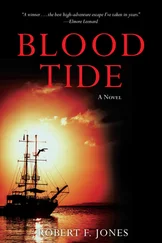There was an eerie silence. Looking behind him at the French patrol boat, the solitary pirate on the ladder began a rapid descent. Suddenly the outboard motor started up and the bow of the little skiff swung round. The man on the ladder jumped, clearly hoping to land amongst his colleagues. Too late: the skiff had already accelerated away, and he landed with an enormous splash in the water.
Ignoring him, Thibault tersely issued orders and at once the corvette took off after the skiff. In less than thirty seconds she was closing in, though the pirates showed no sign of slowing down.
‘Two warning bursts,’ the Captain ordered, then watched as his men on the bow swung the.30 mm cannons towards the skiff. They fired a line of tracer shells that sailed just ahead of the smaller boat, a few of them skimming the surface like stones thrown from a beach.
Now the skiff slowed down, and the French ship slowed too, cutting the engine and floating towards the smaller craft. The French sailors on the forward deck watched the armed men in the skiff intently. They were close enough to distinguish the individual figures, wearing jeans and T-shirts; as they drew nearer they could see details of the men’s faces, some half-obscured by dark glasses. But it was the weapons they were watching most closely. Suddenly two men stood up, rocking the skiff with the abrupt movement. They raised their rifles and cracking sounds rang out above the low throb of the corvette’s engines.
The sailors on the bow hit the deck as it was sprayed with bullets. A second burst of gunfire rattled against the steel-plated bridge where Thibault was standing. He ducked, shouting, ‘Hole that boat!’
The gunners swung their cannons round to point directly at the skiff and fired. A hole appeared above the little vessel’s waterline, and the skiff began rapidly to take on water. One of the pirates stood up and jumped overboard just before the skiff tilted sharply to one side, dumping the rest of the crew into the sea. Then it sank beneath the surface.
What fools, thought Thibault, taking on an armed naval vessel. What did they think they were playing at?
Two hours later he was none the wiser. Below deck, in the long low room that doubled as both mess and lounge for his crew, the prisoners sat ranged on two benches. They included the hapless pirate who had jumped for it from halfway up the side of the Aristides. It turned out he could hardly swim; he would have drowned if a crewman from the container ship had not thrown him a lifeline.
Thibault had ordered his men to search the prisoners for weapons, but the three Kalashnikovs seemed to be the extent of their armoury – and they were now lying at the bottom of the ocean.
The pirates were uncommunicative, merely shrugging when Thibault attempted to question them. From time to time they spoke to each other in short bursts of Arabic. Marceau, Algerian by origin and an Arabic speaker from childhood, spoke to them but they just ignored him. Though Arabic was one of Somalia’s national languages, these men were not Somali – their appearance was Middle Eastern rather than African. Thibault was puzzled; he’d expected them to be local pirates, operating from the Somalian coast.
As he watched them, he noticed that one of the seven looked more Asian than Middle Eastern, and saw too that the other men didn’t include him in their muttered exchanges. He seemed to be younger than the others: average height, lean, with the scraggly beginnings of a beard that gave away his youth. His eyes wouldn’t stay still, searching anxiously around the room, and where the others looked coolly indifferent to their plight, he appeared terrified.
‘Marceau,’ said Thibault quietly. ‘The lad at the end there… the one with the blue shirt. I want him searched.’
‘We searched them all already,’ came the reply.
‘Yes, yes. Do it again – and a strip search this time. There’s something different about him.’
Marceau gestured to two sailors, and together they approached the youth at the end of the bench. His eyes widened as they motioned him to get up, then led him through the bulkhead to the adjacent shower room. The other prisoners watched sullenly.
Marceau was back a few minutes later.
‘Where’s the prisoner?’ asked Thibault.
‘Still in there,’ said Marceau with a shrug, gesturing to the shower room. ‘He’s not feeling well.’
I bet, thought Thibault, knowing how brutal Marceau could be. He was about to chastise his second-in-command when Marceau held out a little square of plastic, about the size of a credit card. ‘We found this in the lining of his back pocket.’
Thibault inspected the card. It was a driving licence, issued three years before and due to expire in another twenty-two. The photograph in one corner was of a young man, a boy really, clean-shaven and short-haired. But the eyes looked the same. His name, according to the licence, was Amir Khan.
Pakistani, thought Thibault. Or with Pakistani parents, perhaps, since this was a British driving licence. It gave Khan’s address as 57 Farndon Street, Birmingham.
Thibault shook his head in wonder. What on earth was a British national doing here, attempting to hijack a cargo ship in the Indian Ocean?
It was 10.30 a.m. in Athens when the phone rang on Mitchell Berger’s desk. The call was from overseas; Berger listened to it with increasing agitation.
‘Are the crew all safe?’ he asked finally.
He waited for the reply, then said, ‘When will they reach Mombasa?… All right – they’ve only lost a day. I’ll alert our people there.’
Berger put down the phone, trying to gather his thoughts, looking down from the window of his second-storey office at the street below. It was the Greek version of an English suburban High Street, full of small shops and restaurants. Even in spring the sun outside would be scorching by mid-afternoon, so the locals shopped in the morning.
Berger liked Athens, just as he liked virtually any part of the world – so long as it wasn’t the small South Dakota town where he’d grown up, a place of such stifling dullness that he liked to pretend he’d forgotten its name. Berger had fled it at the first opportunity, enlisting in the army on the day he turned seventeen. His four-year hitch had taken him to Germany, then Korea, and given him a taste for foreign countries. He’d also discovered he wasn’t as stupid as his alcoholic parents had always made out – when he’d left the army he’d gone to college on the GI Bill, and done well enough to go on and take a Masters in International Relations at Tufts University. Credentials enough for the career that had followed in the next three decades, working in four continents and a dozen countries.
It had been an eventful thirty years – too eventful, perhaps, since there had been more than one occasion when Berger had feared for his life. Reaching fifty, unmarried and feeling rootless, he had been on the lookout for a change – this time to a more peaceful existence, nothing too nerve-racking. He had found it; a pleasant billet as head of the Athens office of a UK-based charity called UCSO, the United Charities’ Shipping Organisation. UCSO, as its name implied, was a co-ordinating charity. Its role was to receive requests for aid from NGOs working in the field, to liaise with donors all over Europe, and to arrange for the requested aid – food, equipment, spare parts, whatever it might be – to be assembled in Athens. There Mitchell Berger and his colleagues would make up the cargoes, book the ships and despatch the aid to wherever it was needed. Much of the focus of UCSO’s efforts was on crisis areas in Africa, though it had played an important role in the immediate relief operation after the 2004 tsunami. Unlike some other charities, UCSO prided itself on its efficiency rather than its public profile, and had an unsurpassed record in getting aid to wherever it was most needed.
Читать дальше












